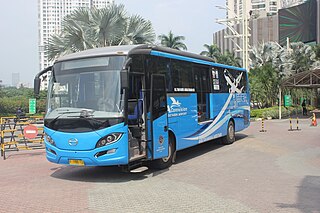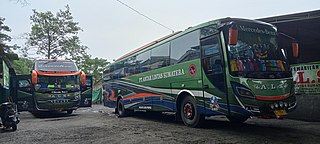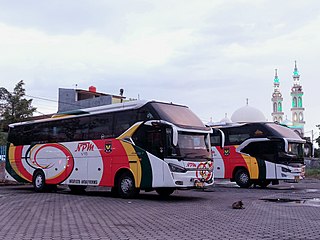
Indonesia's transport system has been shaped over time by the economic resource base of an archipelago with thousands of islands, and the distribution of its more than 200 million people concentrated mainly on a single island, Java.

Tourism in Indonesia is an important component of the Indonesian economy as well as a significant source of its foreign exchange revenues. Indonesia was ranked at 20th in the world tourist Industry in 2017, also ranked as the ninth-fastest growing tourist sector in the world, the third-fastest growing in Asia and fastest-growing in Southeast Asia. In 2018, Denpasar, Jakarta and Batam are among of 10 cities in the world with fastest growth in tourism, 32.7, 29.2 and 23.3 percent respectively. The tourism sector ranked as the 4th largest among goods and services export sectors.

A double-decker bus or double-deck bus is a bus that has two storeys or decks. Double-deckers are primarily for commuter transport, but open-top models are used as sight-seeing buses for tourists, and there are coaches too for long-distance travel. They appear in many places around the world but are presently most commonly used as mass transport in cities of Britain and Ireland, in Hong Kong, and in Singapore.

The majority of Indonesia's railways are on Java, used for both passenger and freight transport. There are three noncontinuous railway networks in Sumatra while two new networks are being developed in Kalimantan and Sulawesi. Indonesia has finalized its plan for a national railway network recently. According to the plan, 3,200 km of train tracks that will criss-cross the islands of Sumatra, Java, Kalimantan, and Sulawesi, it has been touted as the most extensive railway project in Indonesia since its independence from the Dutch in 1945. Indonesia targets to extend the national railway network to 10,524 kilometres by 2030. As of September 2022, the network spans 7,032 km.

Taman Mini Indonesia Indah is a culture-based recreational area located in East Jakarta, Indonesia. Since July 2021, it is operated by PT Taman Wisata Candi Borobudur, Prambanan, dan Ratu Boko, a subsidiary of the state-owned tourism holding company Injourney. It was operated by Yayasan Harapan Kita, a foundation established by Siti Hartinah, the first lady during most of the New Order and wife of Suharto, and run by Suharto's descendants since his death until 2021. It has an area of about 147 hectares. The project cost some US$ 26 million.

TransJakarta or Jakarta BRT is a bus rapid transit (BRT) system in Jakarta, Indonesia. The first BRT system in Southeast Asia, it commenced operations on 15 January 2004 to provide a fast public transport system to help reduce rush hour traffic. The system is considered as the first revolutionary public transit mode in the capital city of Indonesia. The buses run in dedicated lanes (busways), and ticket prices are subsidised by the regional government. TransJakarta has the world's longest BRT system, which operates about 4,300 buses. TransJakarta aims to have 50 percent of its fleet be electric buses by 2027. By 2030, the aim is for the entire TransJakarta ecosystem to use electric buses. As of November 2023, it serves an average of 1.134 million passengers daily.

PT Kereta Api Indonesia (Persero) (lit. 'Indonesian Railways (State-owned) Limited', abbreviated as PT KAI or simply KAI) is a major railway operator in Indonesia and one of the public railway companies in the country. It is state-owned and pays track access charges. Its headquarters are located in Bandung, West Java. In 2019, KAI carried 429 million passengers and 47.2 million tonnes of cargo.
PT Industri Kereta Api (Persero), abbreviated as INKA, is an Indonesian state owned rolling stock manufacturer.

Pulo Gebang Bus Terminal is a type-A bus terminal at Cakung, in East Jakarta, Indonesia, which is arguably the largest of its kind in Southeast Asia. The terminal was opened on 28 December 2016. Designed by Paul Tanjung Tan, this terminal is built to replace the unfeasible Pulo Gadung terminal and providing a comfortable, safe, and well-accessible transportation service. Buses to and from Central & East Java usually use this terminal.

Perusahaan Umum Pengangkutan Penumpang Djakarta was an Indonesian statutory corporation that moves in the transportation sector, specifically land transportation in Jakarta and areas around. It is known that Perum PPD operates approximately 494 single buses and 59 articulated buses for TransJakarta. Perum PPD is also known to operate JA Connexion, JR Connexion and Transjabodetabek routes serving Jakarta's suburban area and Trans Sarbagita in Denpasar, Bali.

DAMRI Public Corporation is an Indonesian state-owned bus operator. Under further development as a public company, the name DAMRI is still used as a brand mark of this state-owned company that still carries out passenger and cargo transport using buses and trucks.

PT. Pahala Kencana is a transportation service company based in North Jakarta, Indonesia.
PT EZRI Damai Sejahtera also known as EZRI, is a passenger bus company from Pekalongan, Indonesia. The company serves a number of cities on the island of Java by crossing the northern coast of Java.

Trans Semarang is a bus transit system in Semarang City and (partly) Semarang Regency, Central Java, Indonesia. The service is aim to break down congestion in Semarang and to accommodate commuters to the city center and tourist destinations in the city. One that distinguishes Trans Semarang from other city bus services is its high-deck fleet so that service users use special shelters.

Perusahaan Otobus Antar Lintas Sumatera, abbreviated PO ALS, is an Indonesian autobus company based in Medan, North Sumatra. Founded in 1965, it primarily serves intercity bus routes between cities in Sumatra, in addition to routes to various cities in Java.

PT Naikilah Perusahaan Minang, abbreviated as NPM, is an Indonesian autobus company based in Padang Panjang, West Sumatra. Founded in 1937, it is the oldest operating autobus company in Indonesia.

The TransJakarta Corridor 7 is a bus rapid transit corridor in East Jakarta, Jakarta, Indonesia, operated by TransJakarta. It connects the Kampung Rambutan Bus Terminal in Ciracas to the Kampung Melayu Bus Terminal in Jatinegara. The streets that passed by corridor 7 are Gedong Timur/Barat, Raya Bogor, Mayjen Sutoyo, MT Haryono, and Otto Iskandardinata streets. This corridor is the only TransJakarta corridor that is not integrated with the KRL Commuterline system, because the distance between the Kampung Melayu station and the nearest Commuterline station, Tebet, is quite far.

TransJakarta Corridor 12 is a bus rapid transit corridor in Jakarta, Indonesia, operated by TransJakarta. It connects the Pluit BRT station to the Tanjung Priok bus terminal. The streets that passed by corridor 12 are along Pluit Putri/Putra, Pluit Timur, Pluit Selatan, Jembatan Tiga, Bandengan Selatan, Gedong Panjang, Kopi, Tiang Bendera 5, Roa Malaka Utara, Tiang Bendera, Kunir, Lada Dalam, Bank, Kali Besar Barat, Jembatan Batu, Mangga Dua, Gunung Sahari, Angkasa, HBR Motik, Danau Sunter Barat, Danau Sunter Utara, Mitra Sunter Boulevard, Danau Sunter Selatan Dalam, Yos Sudarso, and Enggano streets. This corridor is integrated with Jakarta Kota Station at the Kota BRT station, Kampung Bandan Station at Mangga Dua BRT station, and also the Tanjung Priuk railway station at the Tanjung Priok terminal.


















